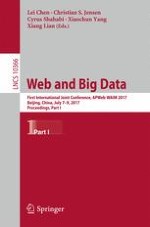2017 | OriginalPaper | Chapter
DFDS: A Domain-Independent Framework for Document-Level Sentiment Analysis Based on RST
Authors : Zhenyu Zhao, Guozheng Rao, Zhiyong Feng
Published in: Web and Big Data
Publisher: Springer International Publishing
Activate our intelligent search to find suitable subject content or patents.
Select sections of text to find matching patents with Artificial Intelligence. powered by
Select sections of text to find additional relevant content using AI-assisted search. powered by
